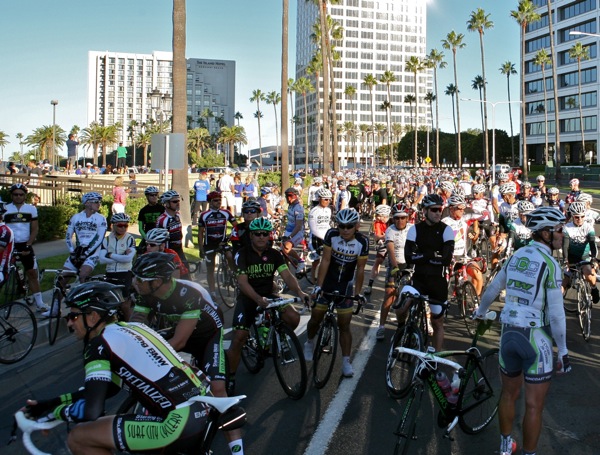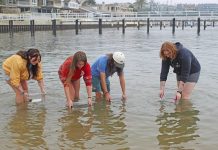
The driver of a truck involved in the Sept. 14 death of bicyclist Sarah Leaf has been cleared, and the investigation has concluded, police confirmed in an email this week.
“The Newport Beach Police Department’s investigation shows Ms. Leaf and the driver of the truck both made right turns from eastbound East Coast Highway to southbound Bayside Drive,” said Kathy Lowe, a police spokeswoman, in an email.
“While making her turn, Ms. Leaf began to lose control of her bicycle and subsequently fell into the number two lane of southbound Bayside Drive. Ms. Leaf fell underneath the truck and the truck then traveled over her body. There was no evidence to indicate that the truck and bike made contact prior to Ms. Leaf falling to the ground.”
No drugs or alcohol were involved, she said.
The news came as the city was painting “sharrows” on East Coast Highway this week. Crews removed a temporary lane merge along East Coast Highway near MacArthur Boulevard Tuesday, and the sharrows were painted Wednesday night.
Sharrows are painted markings that remind bicyclists and motorists that bikes have the right to use a traffic lane. The City Council unanimously voted to have sharrows painted along East Coast Highway through Corona del Mar in a July meeting.
After three cyclists were struck by trucks in separate incidents in September, killing Leaf and another women, city officials agreed to install the sharrows in October rather than waiting for extensive public outreach.
The temporary merge lane removed this week was a traffic study urged by the CdM Business Improvement District to improve traffic at the often congested location, but it is not likely to be made permanent.
City Council members agreed at an Oct. 23 meeting that a traffic study should be ended, although the members voted to discuss the results of the study at a meeting scheduled for Nov. 13.
A staff report that said the traffic study increased congestion in the area, and a citizen survey returned more negative than positive reposnses.
If City Council members agree with staff and decide the traffic study was too big a failure to go forward with the project, then the BID board decided they would ask for another option included in the staff report – a permanent removal of parking spaces. The former parking spaces could be used for landscaping improvements.
The parking spots within the MacArthur intersection are dangerous, city staff said, and should not be replaced even after delineators and other aspects of the traffic study are removed . The spaces could be replaced, possibly by making Carnation Avenue a one-way street for one block.
The traffic study was installed in June and moved the pinch lane — where three traffic lanes merge to two — from MacArthur to closer to Avocado Avenue. If the study proved a success in making traffic flow more smoothly, it could have paved the way for a beautification project that would have converted the former traffic lane into an expanded sidewalk with room for art shows and other civic events as well as improved landscaping.
Traffic, however, was more congested when the pinch lane was moved, according to a staff report. Also, more residents who responded to a city survey about the project expressed negative opinions than positive.
At the Corona del Mar Business Improvement board meeting last week, members said they were disappointed but resigned to the project’s failure.
Jim Walker, owner of The Bungalow restaurant, said the traffic study seemed to make the area more safe.
“It may have backed up traffic, but it’s been a lot safer,” he said. “You haven’t had people merging in there, slamming on their brakes. I’ve certainly noticed a lot less screeching of brakes, tempers flaring, with people cutting in front of somebody else.”
Mayor Nancy Gardner and Councilmember Ed Selich attended the BID meeting and encouraged members to fight for their project.
“I don’t know that you should go in there assuming it’s a lost cause,” Gardner said. “I’d go in there saying ‘I believe in this project,’” although she added that she thinks going forward with the original project is ” a long shot.”
The traffic study cost about $10,000, paid for by the BID.
– By Amy Senk
Reprinted from Corona del Mar Today




